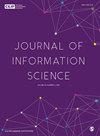波斯人道德情感分析的基于变换的深度学习模型
IF 1.7
4区 管理学
Q3 COMPUTER SCIENCE, INFORMATION SYSTEMS
引用次数: 0
摘要
网络交流中的道德表达会对框架讨论和随后的网络行为产生严重影响。尽管对从英语文本中提取道德情感进行了研究,但其他低资源语言,如波斯语,缺乏足够的资源和对这一重要主题的研究。我们使用道德基础理论(MFT)作为道德心理学的理论范式来解决这个问题。我们开发了一个由8000条推文组成的推特数据集,这些推文被手动注释为道德基础,我们还建立了一个从波斯文本中计算道德情感的基线。我们评估了大量最先进的机器学习模型,包括基于规则的和神经的,包括分布式字典表示(DDR)、长短期记忆(LSTM)和来自转换器的双向编码器表示(BERT)。我们的研究结果表明,在不同的模型中,用线性网络作为分类器对预先训练的波斯BERT语言模型进行微调会产生最好的结果。此外,我们分析了这个模型,以找出模型的哪一层对这种卓越的精度贡献最大。我们还提出了一种基于变换器的替代模型,尽管BERT模型具有较低的规模和较快的推理时间,但它能产生与BERT模型有竞争力的结果。所提出的模型可以作为分析波斯文本中道德情感和框架的工具,用于下游的社会和心理研究。我们也希望我们的工作能为进一步改进波斯文本中道德情感的计算方法提供一些资源。本文章由计算机程序翻译,如有差异,请以英文原文为准。
A transformer-based deep learning model for Persian moral sentiment analysis
Moral expressions in online communications can have a serious impact on framing discussions and subsequent online behaviours. Despite research on extracting moral sentiment from English text, other low-resource languages, such as Persian, lack enough resources and research about this important topic. We address this issue using the Moral Foundation theory (MFT) as the theoretical moral psychology paradigm. We developed a Twitter data set of 8000 tweets that are manually annotated for moral foundations and also we established a baseline for computing moral sentiment from Persian text. We evaluate a plethora of state-of-the-art machine learning models, both rule-based and neural, including distributed dictionary representation (DDR), long short-term memory (LSTM) and bidirectional encoder representations from transformer (BERT). Our findings show that among different models, fine-tuning a pre-trained Persian BERT language model with a linear network as the classifier yields the best results. Furthermore, we analysed this model to find out which layer of the model contributes most to this superior accuracy. We also proposed an alternative transformer-based model that yields competitive results to the BERT model despite its lower size and faster inference time. The proposed model can be used as a tool for analysing moral sentiment and framing in Persian texts for downstream social and psychological studies. We also hope our work provides some resources for further enhancing the methods for computing moral sentiment in Persian text.
求助全文
通过发布文献求助,成功后即可免费获取论文全文。
去求助
来源期刊

Journal of Information Science
工程技术-计算机:信息系统
CiteScore
6.80
自引率
8.30%
发文量
121
审稿时长
4 months
期刊介绍:
The Journal of Information Science is a peer-reviewed international journal of high repute covering topics of interest to all those researching and working in the sciences of information and knowledge management. The Editors welcome material on any aspect of information science theory, policy, application or practice that will advance thinking in the field.
 求助内容:
求助内容: 应助结果提醒方式:
应助结果提醒方式:


